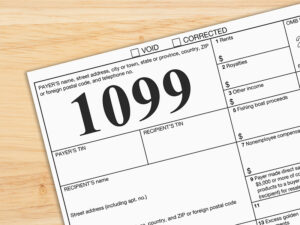Coping With New Employee Retention Credit Rules
Kirsch CPA Group
Jan 20, 2022

Sometimes, Uncle Sam seems to give with one hand and take with the other. Take the employee retention credit (ERC), for example. Congress created this tax break in 2020 to help businesses continue to pay their workers following the onset of the COVID-19 pandemic. Then legislators extended the credit, with enhancements, through 2021. However, the new infrastructure act repeals the ERC for the final quarter of 2021.
Fortunately, the IRS has released new guidance to help employers make sense of the repeal. Specifically, Notice 2021-65 explains how the retroactive tax law change applies to employers that have based their deposits on the old law.
Looking Back at the CARES Act
Initially, the Coronavirus Aid, Relief, and Economic Security (CARES) Act authorized the ERC for 50% of qualified wages paid after March 12, 2020, and before January 1, 2021. Eligible employers could benefit immediately because the credit reduced the Social Security component of employment tax deposits. If current deposits didn’t cover the credit, employers could obtain an advance payment from the IRS.
To qualify for the ERC, an employer had to meet one of two requirements during a calendar quarter:
- It fully or partially suspended operations because government authorities limited commerce, travel or group meetings because of pandemic concerns, or
- It experienced a significant decline in gross receipts. For this purpose, a “significant decline” occurred when gross receipts were less than 50% of gross receipts in the same calendar quarter of 2019.
The first $10,000 of wages paid to an employee during the designated time qualified for the credit. Therefore, employers could claim a maximum credit of $5,000 per employee, though wages eligible for the credits were reduced for large employers.
CAA and ARPA Extensions
The Consolidated Appropriations Act (CAA) extended the ERC through the first two quarters of 2021, with enhancements. Notably, the CAA increased the credit to 70% of the first $10,000 of qualified wages for two quarters, for a maximum credit per worker of $14,000. In addition, a safe-harbor rule was introduced to permit employers to determine their eligibility by using gross receipts from the previous quarter.
Subsequently, the American Recue Plan Act (ARPA) extended the ERC again — this time through the end of 2021, with a maximum annual credit of $28,000 per worker. The ARPA also allows qualified startups to claim the credit. Businesses must have launched after February 15, 2020, and be able to show average gross receipts of less than $1 million. Qualified companies can claim a total ERC of $50,000 for 2021’s third quarter and another $50,000 for 2021’s fourth quarter.
Furthermore, the ARPA established a special rule for businesses that are “severely financially distressed.” Large employers generally can claim the credit only for wages paid to an employee not providing services. However, severely financially distressed employers can take all wages paid into consideration. A severely financially distressed employer must have gross receipts for the calendar quarter of less than 10% of gross receipts from the same calendar quarter in 2019.
Infrastructure Law Kills Credit
Now, the ERC has come to the end of its life. November 2021’s Infrastructure Investment and Jobs Act (IIJA) included a provision that retroactively repeals the ERC for wages paid after September 30, 2021, except for qualified startups.
Note: Although the IIJA ends the ERC early, employers still have three years to make a prior claim under the program.
Soon after the IIJA was enacted, the IRS issued Notice 2021-65. It provides guidance to employers that paid wages after September 30, 2021, and claimed an advanced credit or reduced employment taxes in anticipation of qualifying for the ERC. The guidance also explains the rules for startup companies that want to claim the credit for 2021’s fourth quarter.
Highlights of Notice 2021-65 include the following:
- If a non-startup employer received an advance credit for wages paid in 2021’s fourth quarter, it won’t be assessed a penalty if it repays those amounts by the due date of its employment tax returns.
- A non-startup employer that reduced deposits on or before December 20, 2021, for wages paid during the fourth quarter in anticipation of receiving the ERC can avoid penalties. The employer just has to deposit those amounts on or before the due date for wages paid on December 31, 2021, regardless of whether it actually pays wages on that date. Deposit due dates vary depending on the employer’s tax deposit schedule.
- Employers must report tax liability resulting from the ERC’s termination on the applicable employment tax return or schedule for the period spanning October 1, 2021, through December 31, 2021. The IRS has provided detailed instructions on reporting this tax liability.
- If an employer doesn’t qualify for relief under Notice 2021-65, it may reply to a notice about a penalty with an explanation. The IRS will consider whether relief for a reasonable cause is warranted.
Practical Suggestion
The end of the ERC may have come as a rather abrupt and unwelcome change for your organization. Meet with Kirsch CPA Group to determine the impact of recent legislation and for help finding other tax breaks that can potentially offset liabilities.
Contact us to learn more about employee retention credit
© Copyright 2022. All rights reserved.
More Resources

About The Author
Kirsch CPA Group is a full service CPA and business advisory firm helping businesses and organizations with accounting,…
Sign Up for Email Updates
Tags
Accounting & Financial News

1099 Rules Changes for Businesses
The One Big Beautiful Bill Act (OBBBA) eased the rules in 2026 for Form 1099-NEC, "Nonemployee Compensation,"…




